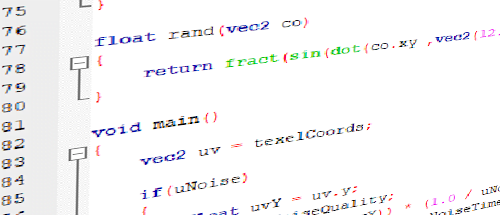There’s a more indepth article that has since been written here. It contains the content of the following article and improves upon it.
Learn how to wrap OpenGL calls in C++ to automatically detect errors. Much like I did with OpenGL, I wrap my OpenAL calls in error checking mechanisms.
Here’s how.
The first thing to do is create two pre-processor defines. We need two, because unlike OpenGL, OpenAL has two different kinds of function calls, alFunctionName and alcFunctionName.
#define alCall(function, ...) alCallImpl(__FILE__, __LINE__, function, __VA_ARGS__)
#define alcCall(function, device, ...) alcCallImpl(__FILE__, __LINE__, function, device, __VA_ARGS__)Code language: C++ (cpp)Next we need a couple of functions that will check for either AL_ERRORs or ALC_ERRORs.
void check_al_errors(const std::string& filename, const std::uint_fast32_t line)
{
ALCenum error = alGetError();
if(error != AL_NO_ERROR)
{
std::cerr << "***ERROR*** (" << filename << ": " << line << ")\n" ;
switch(error)
{
case AL_INVALID_NAME:
std::cerr << "AL_INVALID_NAME: a bad name (ID) was passed to an OpenAL function";
break;
case AL_INVALID_ENUM:
std::cerr << "AL_INVALID_ENUM: an invalid enum value was passed to an OpenAL function";
break;
case AL_INVALID_VALUE:
std::cerr << "AL_INVALID_VALUE: an invalid value was passed to an OpenAL function";
break;
case AL_INVALID_OPERATION:
std::cerr << "AL_INVALID_OPERATION: the requested operation is not valid";
break;
case AL_OUT_OF_MEMORY:
std::cerr << "AL_OUT_OF_MEMORY: the requested operation resulted in OpenAL running out of memory";
break;
default:
std::cerr << "UNKNOWN AL ERROR: " << error;
}
std::cerr << std::endl;
}
}
void check_alc_errors(const std::string& filename, const std::uint_fast32_t line, ALCdevice* device)
{
ALCenum error = alcGetError(device);
if(error != ALC_NO_ERROR)
{
std::cerr << "***ERROR*** (" << filename << ": " << line << ")\n" ;
switch(error)
{
case ALC_INVALID_VALUE:
std::cerr << "ALC_INVALID_VALUE: an invalid value was passed to an OpenAL function";
break;
case ALC_INVALID_DEVICE:
std::cerr << "ALC_INVALID_DEVICE: a bad device was passed to an OpenAL function";
break;
case ALC_INVALID_CONTEXT:
std::cerr << "ALC_INVALID_CONTEXT: a bad context was passed to an OpenAL function";
break;
case ALC_INVALID_ENUM:
std::cerr << "ALC_INVALID_ENUM: an unknown enum value was passed to an OpenAL function";
break;
case ALC_OUT_OF_MEMORY:
std::cerr << "ALC_OUT_OF_MEMORY: an unknown enum value was passed to an OpenAL function";
break;
default:
std::cerr << "UNKNOWN ALC ERROR: " << error;
}
std::cerr << std::endl;
}
}Code language: C++ (cpp)With those out of the way, we can define the ...Impl functions that the #defines are going to call. First we’ll start with the alFunction ones:
template<typename alFunction, typename... Params>
auto alCallImpl(const char* filename, const std::uint_fast32_t line, alFunction function, Params... params)
->typename std::enable_if<std::is_same<void,decltype(function(params...))>::value, decltype(function(params...))>::type
{
function(std::forward<Params>(params)...);
check_al_errors(filename, line);
}
template<typename alFunction, typename... Params>
auto alCallImpl(const char* filename, const std::uint_fast32_t line, alFunction function, Params... params)
->typename std::enable_if<!std::is_same<void, decltype(function(params...))>::value,decltype(function(params...))>::type
{
auto ret = function(std::forward<Params>(params)...);
check_al_errors(filename, line);
return ret;
}Code language: C++ (cpp)Unlike my OpenGL ones, I haven’t bothered to return true or false on success or failure because I haven’t come across a need to. This allows me to return the result of the function call rather than redirecting the return value to an output parameter.
Your mileage may vary and you might want to model it more after my OpenGL code than this OpenAL code.
The alcFunction calls are much the same:
template<typename alcFunction, typename... Params>
auto alcCallImpl(const char* filename, const std::uint_fast32_t line, alcFunction function, ALCdevice* device, Params... params)
->typename std::enable_if<std::is_same<void,decltype(function(params...))>::value,decltype(function(params...))>::type
{
function(std::forward<Params>(params)...);
check_alc_errors(filename,line,device);
}
template<typename alcFunction, typename... Params>
auto alcCallImpl(const char* filename, const std::uint_fast32_t line, alcFunction function, ALCdevice* device, Params... params)
->typename std::enable_if<!std::is_same<void,decltype(function(params...))>::value,decltype(function(params...))>::type
{
auto ret = function(std::forward<Params>(params)...);
check_alc_errors(filename,line,device);
return ret;
}Code language: C++ (cpp)The last part is just to remember to use alcCall vs alCall at the right times.
alCall(alGenSources, 1, &audioData.source);Code language: C++ (cpp)openALContext = alcCall(alcCreateContext, openALDevice, openALDevice, nullptr);
if(!openALContext)
{
std::cerr << "ERROR: Could not create audio context" << std::endl;
return false;
}Code language: C++ (cpp)Hope this helps someone with adding sound and music to their own hobby game engine.
